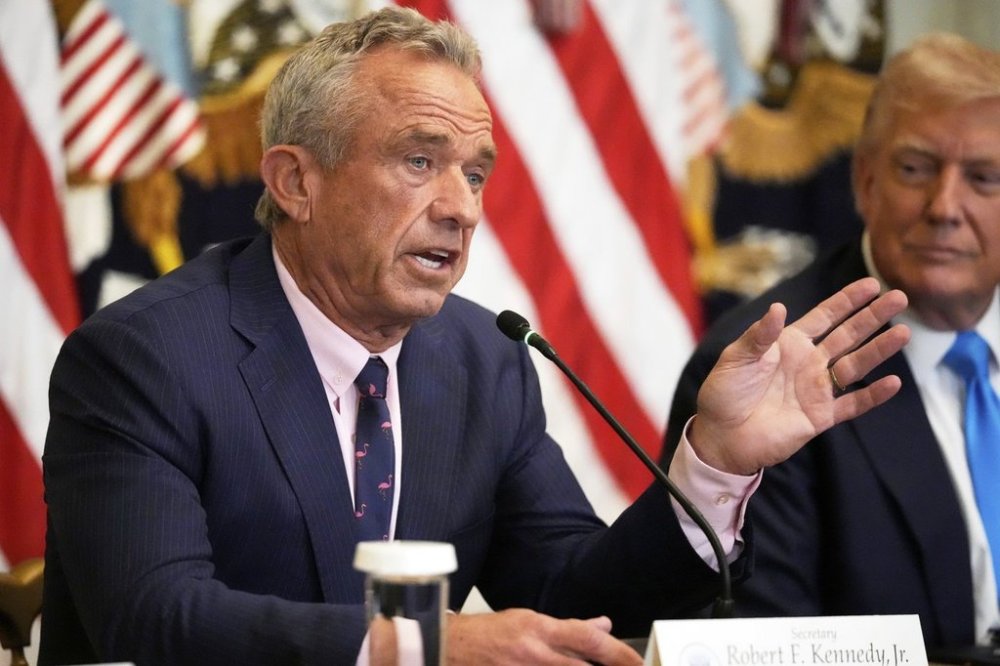Kennedy is a risk to U.S. health care — and beyond
Advertisement
Read this article for free:
or
Already have an account? Log in here »
We need your support!
Local journalism needs your support!
As we navigate through unprecedented times, our journalists are working harder than ever to bring you the latest local updates to keep you safe and informed.
Now, more than ever, we need your support.
Starting at $15.99 plus taxes every four weeks you can access your Brandon Sun online and full access to all content as it appears on our website.
Subscribe Nowor call circulation directly at (204) 727-0527.
Your pledge helps to ensure we provide the news that matters most to your community!
To continue reading, please subscribe:
Add Brandon Sun access to your Winnipeg Free Press subscription for only
$1 for the first 4 weeks*
*$1 will be added to your next bill. After your 4 weeks access is complete your rate will increase by $4.99 a X percent off the regular rate.
Read unlimited articles for free today:
or
Already have an account? Log in here »
You may not have heard, but public mistrust in vaccines is growing, per U.S. Health and Human Services Secretary Robert F. Kennedy Jr.
And he should know — he was the one sowing that mistrust before he took the office.
Kennedy, now working as part of the Trump administration, has been a prominent antivac-

cine advocate, although one whose information is often dubious. He has, for example, claimed that American children receive as many as 92 vaccines between maternity and adulthood — the number is actually about 30, although many of them are combined injections and so children are not actually getting 30 jabs.
He has also linked vaccinations to autism in children, as well as “environmental exposure” because he fails to understand that the reason autism diagnoses are more common now than in his own childhood is because, simply put, fewer children were diagnosed then who could have been.
And now, with the power to influence health-care policy in the U.S. at his fingertips, he is intent on proving himself right about the nefarious impact of vaccines.
“The U.S. faces a crisis of public trust. Whether toward health agencies, pharmaceutical compa-
nies or vaccines themselves, public confidence is waning,” Kennedy wrote on the HHS website in June, citing conflicts of interest, “persecution of dissidents” and other supposed malefactors that have “plagued the vaccine regulatory appartus for decades.”
Never fear, though: “Under my direction, the U.S. Department of Health and Human Services is putting the restoration of public trust above any pro- or antivaccine agenda.”
Kennedy claims that his investigative efforts, part of which involves establishing an immuni-
zation practices advisory committee, is in the service of “unbiased science.”
However, his other activities suggest he is much more intent on forwarding “anti” rather than “pro” vaccine agendas.
On Aug. 5, Kennedy cancelled US$500 million in vaccine funding, including funds for COVID-19 vaccines. And more recently, on Aug. 22, Nature reported that Kennedy demanded the retraction of a Danish study which found no link between aluminum in vaccines and chronic childhood disease. (Annals of Internal Medicine, which published the study, denied his request).
He fired an entire panel of independent experts making vaccine recommendations in June.
We have written in this space previously that the danger posed by Kennedy is that he is not sim-
ply playing a political game — he is not a snake-oil salesman, but a customer. He does sincerely believe what he says, and that is a terrible thing for the state of health care in the United States — and by extenstion, any nations to which Americans might travel.
U.S. Senate lawmakers had a difficult road grilling Kennedy on his leadership. He defied attempts to get him to admit the COVID-19 vaccine saved lives, before he finally conceded that it had; he also claimed not to know how many Americans had died of the disease, when that data has been broadly available for years — the Centers for Disease Control and Prevention says more than one million deaths, as of September 2023.
The entire situation is a mess, but it’s hard to feel any sympathy for the frustrated senators tasked with grilling Kennedy. Despite his very public history as an anti-vaccine activist, they still voted to confirm him and send him to his current position.
Health care in general, but particularly vaccination, is at severe risk in the United States. The data have long been clear that vaccines are safe and effective — more so now than ever. It is imperative that American lawmakers use whatever tools they have to mitigate the harm posed by Kennedy’s meddling — for the sake of all Americans, and more besides.
» Winnipeg Free Press
